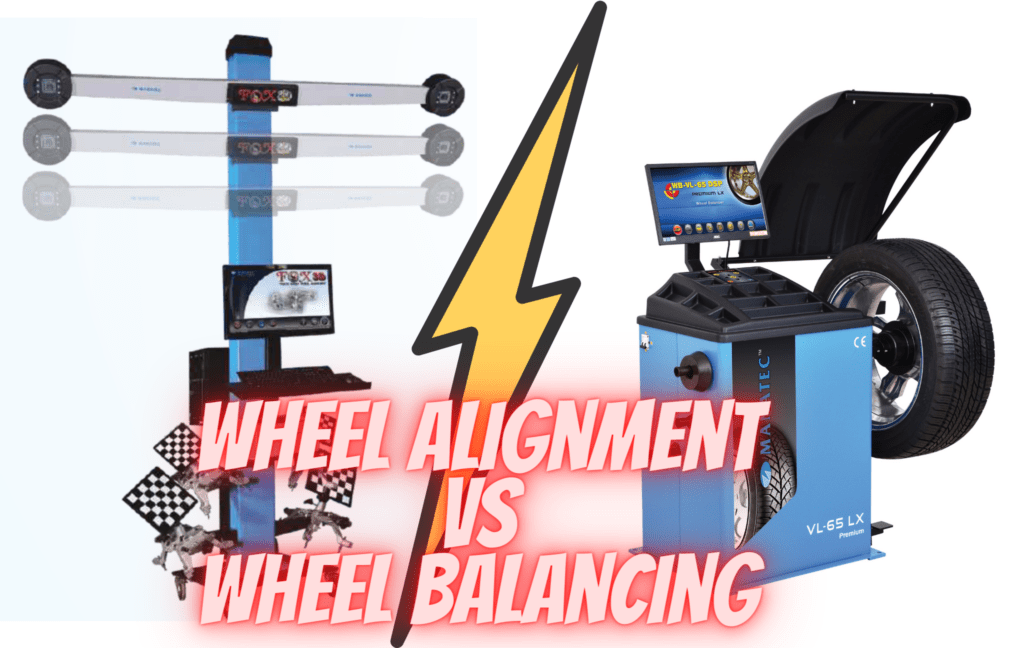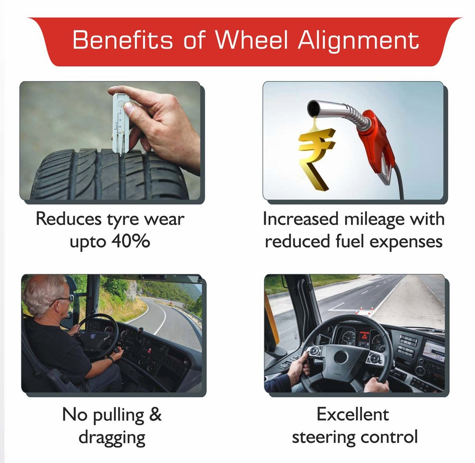
While pronouncing the word it looks similar which are often confused to be same, but not for everyone if you have a little bit knowledge about the tyres and its maintenance means you know the exact difference between Wheel Alignment and Wheel Balancing. But there is one common thing to know both will ensure the safety.
There are lot of accidents occurs in our country due to improper tyre maintenance which causes
Tyre burst
Tyre wobbling
Steering pull problem
Humanity depends on the vehicles deployed for mobility. This is relevant, not only for the mobility of human beings but also for the movement of goods and materials that are involved in their day-to-day life. Life will come to a standstill if mobility is stopped.
In the past few decades, extensive research has taken place in the transport segment, and innovative products, such as the electric vehicle and driverless vehicle, have come up. Every vehicle manufacturer is brewing up new features and technologies in their vehicle in order to attract customers. In due course of time, technology will transform drastically, and it will be no wonder if we witness a day when human beings would fly.
It is known that every vehicle needs wheels to run on the road, be it the most expensive vehicle or an electric vehicle or even the age-old bullock cart. To make the travel a smooth and pleasant one, the wheels are fitted with tyres that are filled with air to offer the necessary cushioning effect. These air-filled tyres bear the entire load of the vehicles and also absorb the varying forces and vibration that arises during the movement. Since tyres are the interface between the road and the vehicle, they withstand these forces and, hence, are subjected to abnormal friction. This friction causes the tyres to wear out. Consequently, these worn-out particles of the tyres get dissolved in the air in the form of ‘Particulate matter’ and increase the pollution levels in the air.
Causes of Tyre wear
If all the above causes are eliminated, a tyre can last for more than a hundred-thousand-kilometres (62,100) run before it wear out fully.
Among the above-listed causes, wheel alignment and wheel balancing are considered to be the most important causes of tyre wear. Although the owner of the vehicle can control and mitigate the other causes of tyre wear, he must depend on the services of a technician for the wheel alignment and wheel balancing of his vehicle. Therefore, it is advisable that the vehicle owner also learn the basic principles of wheel alignment and wheel balancing.

Wheel Alignment and Wheel Balancing
Wheel Alignment and Wheel Balancing are two different subjects and involve two different activities. Wheel balancing must be done first and balanced wheels must be fitted to the vehicle prior to Wheel Alignment.
Wheel Balancing:
Wheel Balancing must be done for every wheel of the vehicle. It is the activity of removing any unbalance in a particular wheel and making it a balanced one. If wheel balancing is not proper in a vehicle, the following problem will be faced;
Wheel Alignment:
Wheel Alignment is an act of making all the wheels of a vehicle travel in a unified direction. This is achieved by maintaining the wheel alignment angles such as Camber, Toe, Caster and King Pin as per the specifications of the vehicles. In other words, the activity oof wheel alignment can be defined as below.
The process of measuring and ensuring the various wheel alignment angles specified by the manufacturer in all the wheels of a vehicle, both individually and collectively, to achieve unidirectional running, is called Wheel alignment.
Nowadays, this is done with the help of wheel alignment computers. These computers measure the various wheel alignment angles and tell us which angles are within limits and which angles are not. The angles that are not within limits will be corrected during the wheel alignment process and made alright for the unidirectional running of all the wheels in the vehicles.
If wheel alignment is incorrect in a vehicle, the following problems will be encountered:
If every vehicle in a country is maintained with proper wheel alignment and wheel balancing, there will be huge saving in tyre expenditure, fuel efficiency, and road safety. Also, pollution levels will decrease, thus indirectly protecting environment.
Assuming that a tyre manufacturer produces high quality tyres, but fails to ensure proper alignment and balancing in the vehicles, thus the tyres will wear out quickly, tarnishing the reputation of the tyre manufacturer. For this reason, all the tyre manufacturers include alignment and balancing in their dealership points to ensure compliance with these activities. This is essential for the survival of the tyre manufacturer in a competitive marketplace.
Conclusion:
This is equally important for the vehicle manufacturers also because when a customer buys a vehicle, his expectations are smooth running and minimum maintenance. All the vehicle dealers also have alignment and balancing services in their facilities.
Manatec Europe BV,
Warandestraat 1A, 9240.
Zele, Belgium.
Phone : +32 492 35 33 40
email : sales@manateceurope.eu

